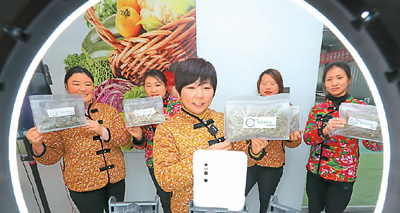Internet technology delivers real benefits to China’s farmers, contributes to its rural construction
The application of Internet technology has greatly optimized the agricultural industry, delivering tangible benefits to farmers, with digital infrastructure having meanwhile been continually upgraded alongside the emergence of new types of businesses that have contributed to the building of a better countryside in China.
In a smart greenhouse in Yan’an city, northwest China’s Shaanxi Province, strawberries are growing in abundance, thanks to the application of various advanced technologies used to facilitate the incorporation of intelligent agriculture practices there.
“I operate the greenhouse through the use of a smartphone,” introduced Li Shiping, owner of the greenhouse. In the past, human labor was all that was available in strawberry cultivation in traditional greenhouses, but nowadays, thanks to the availability of intelligent technologies such as an automated ventilation system, an automated pesticide spraying system and a transportation system used to help growers with their farm work inside the greenhouse, strawberry cultivation is no longer a labor-intensive business.
Smart greenhouses epitomize the development of smart agriculture in China. By embracing various technologies, Chinese farmers can now monitor the conditions of the soil in real time, and achieve efficient pest monitoring, warning and control through the use of smart systems backed up by big data.

Members of a farmers’ cooperative learn sales skills inside a livestreaming room in Shuanglu village, Mengcheng county, east China’s Anhui Province. (Photo/Hu Weiguo)
According to an action plan for the development of digital villages between 2022 and 2025 as recently issued by the Chinese government, the country will take further actions to upgrade its digital infrastructure, achieve the innovative development of intelligent agriculture, and develop new types and models of businesses.
In addition to promoting agricultural production, digital technologies also play a role in improving rural governance and bringing high-quality living standards to rural areas, thus significantly enhancing rural residents’ sense of happiness and well-being.
According to statistics from the Ministry of Industry and Information Technology (MIIT), 5G network coverage has been achieved in more than 97 percent of counties and 40 percent of rural towns across the country.
The Internet also plays a role in supporting the government in efficiently handling affairs that concern the interests of rural residents.
Thanks to an intelligent information system, the local government of Luoyang city, central China’s Henan Province listed 135 items out of nearly 2,000 items that closely concerned the interests of rural residents, having proactively provided services in these fields for rural residents at their doorsteps, according to an official from the rural revitalization bureau of Luoyang.
Besides, by scanning QR codes, the rural residents in Luoyang can also access consultation services, submit suggestions, and make complaints about 87 policies issued by the government that concern 43 industries and departments.
Photos
Related Stories
- County in Zhejiang provides strong financial support to young entrepreneurs returning to hometowns
- Art serves as a welcome approach to help renovate village in SW China’s Chongqing
- China outlines key tasks to fully advance rural vitalization in 2022
- China outlines tasks to advance rural vitalization in 2022
- China employs digital technology for rural vitalization
- Overseas talent returns to hometown in Henan to boost local development
- Wuying Miao village in Guangxi works to improve local quality of life by making improvements to surrounding infrastructure, industries
Copyright © 2022 People's Daily Online. All Rights Reserved.










